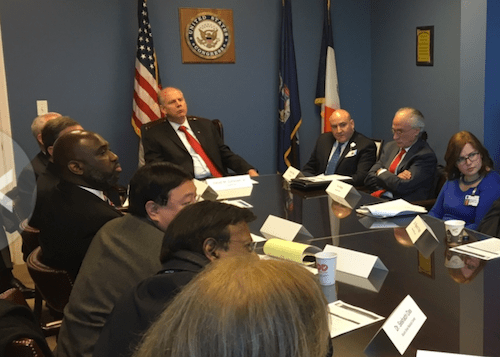Congressman Dan Donovan (R-South Brooklyn, Staten Island) said today the House will likely vote on the Republican-led American Health Care Act (AHCA) replacement to the Affordable Care Act (ACA), also known as Obamacare, next Wednesday or Thursday, but is still undecided on how he will vote.

“I’m still analyzing it. I’ve spent an enormous amount of hours studying the proposal and how it affects the people of South Brooklyn and Staten Island and how it affects people of the state,” said Donovan. “I’m a rarity in Congress, a Republican representing an urban area and the only Republican Congressmember of the 13 Congressmembers representing New York City.”
Back in December 2015, KCP reported that Donovan had real concerns about the ACA regarding how it was crippling small businesses and the middle class with escalating premiums. However, now Donovan has concerns that under the AHCA that 24 million people would lose health insurance.
Other concerns he has with the AHCA are the rising costs it would have on seniors and that those whose income improved and were able to get off Medicaid would not be eligible to get back on it if their income suddenly took a turn for the worse.
Donovan noted that there still could be some changes to the bill, but as it is currently written the AHCA probably won’t be able to pass the Senate.
Donovan’s thoughts came following his meeting last week with healthcare stakeholders, including representatives from both Brooklyn and Staten Island hospitals, community health centers, and private practices, for a roundtable discussion at his Staten Island District Office.
The roundtable gave healthcare organizations and doctors an opportunity to discuss the U.S. healthcare system, including feedback on proposed reform legislation, challenges under the ACA, and innovative ideas to make healthcare more affordable and accessible.
Donovan also met with a few protesters outside of his office to hear their concerns.
“As the healthcare reform process moves forward, it’s critical that we protect those who received coverage under the law, while helping those who’ve been burdened with limited choices and soaring premiums. To learn how to effectively repair our broken healthcare system, we must listen to those who understand the direct impact of policies on patients and their families,” he said.
In regards to immigration Donovan last week penned an op-ed with undocumented immigrant attorney Cesar Vargas for the Washington Post. Below is that op-ed:
We didn’t think we agreed on undocumented immigration. We were wrong.
By Dan Donovan and Cesar Vargas
One of us is a U.S. representative; the other, an undocumented immigrant. We both happen to be lawyers. One of us spent much of his career as a prosecutor; the other has a law practice defending military and immigrant families.
But we both did something last week that isn’t happening enough right now: We spoke to one another honestly and respectfully. And in sharing our experiences, we found that we share more common ground than we thought.
Both of us can trace our presence in this great nation back to immigrant forefathers. Dan Donovan’s great-grandfather came to the United States from Ireland without documents or formal approval. Similarly, Cesar Vargas’s mother brought him across the border from Mexico without authorization when he was 5 years old.
We both agree that undocumented immigrants with violent criminal records have no privilege or right to stay, and federal authorities should target them. But we also agree that many undocumented immigrants aren’t criminals, and they aren’t looking only to take advantage of our generous system for all its worth.
In fact, undocumented residents in the United States pay an estimated $11.74 billion annually in state and local taxes, an amount that would increase significantly if these immigrants were given a pathway to citizenship, according to a new report from the Institute on Taxation and Economic Policy.
Many of them, like Vargas, want to make the best of a situation by becoming contributing members of society. It’s not a productive use of limited federal resources to target all undocumented immigrants indiscriminately for removal.
We further agree that we cannot pick and choose which laws to follow, whether a citizen, an undocumented immigrant or a politician. Duly passed immigration laws must be enforced, and those who did not follow legal procedure in entering the United States cannot earn citizenship or legal status without appropriate penalties.
Millions of people seeking to enter the country the legal way continue to wait in limbo, and that’s evidence of a broken immigration system. We understand the need to modernize our outdated laws to prioritize national security while also acknowledging the deep humanitarian impacts reforms might have.
Any solution must include border security: It’s not inhumane for a sovereign country to know who comes in and out.
It’s true that the definition of who enters legally has changed with evolving immigration laws written to address the concerns of the time. For example, when many immigrants arrived in the United States decades ago, there were no requirements to have an existing family or employment relationship with someone in the country, and no requirement to obtain a visa before arriving, as is the case now.
Ellis Island is also, of course, full of stories of European immigrants who turned their jackets inside out so that the mark placed on them indicating they should be deported would go unnoticed.
A modern system must grant consideration to immigrants who come here to educate themselves and create jobs. It’s insane to give temporary residence to brilliant people from overseas who study at our universities, only to send them back home without an opportunity to put that education to productive use here.
While Congress debates smart enforcement and security for our borders, they can also create a rigorous but fair system that the undocumented population could follow to earn legal status or citizenship, especially for those like Vargas who entered this country at a very young age and have established families and productive careers.
To us, immigration is not just a political issue that we observe from afar — it is intimately woven into every aspect of our lives. Our families came from Ireland, Poland and Mexico, but America is our home.
Whether they crossed the Atlantic Ocean or the southern border, our loved ones traveled thousands of miles for a better life. And isn’t that the American Dream?
For 250 years, those across the world in search of a place to worship and work free from intrusion came to our country motivated by its freedoms and opportunities.
They arrived here speaking little English and toiling at unglamorous jobs with the hopes of one day seeing their children and great-grandchildren graduate from law school and use their God-given gifts to improve the nation they love.
We both came into our meeting with preconceived notions of what the other would say or believe. After all, many political arguments just devolve into name-calling and obstruction rather than constructive cooperation. But we just had to sit down and listen.
When hyperbole and histrionics take center stage, there is no better time to change the conversation with practical policies. We all fail when both sides of the immigration debate retreat into their corners and castigate those with different opinions.
Not every immigrant is a law-abiding family man, but not every immigrant is out to commit crimes, either. Open borders are neither safe nor practical, but villainizing people simply because of their religion or ethnicity is dangerous.
If we keep shouting at one another, our problems will never find solutions. The two of us come from different backgrounds and still disagree on plenty of issues, but we’re at least having these conversations.
Let’s see more of that around the country.






